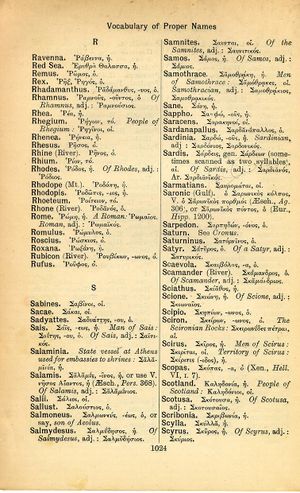Rhamnus: Difference between revisions
Οὐδείς, ὃ νοεῖς μὲν, οἶδεν, ὃ δέ ποιεῖς, βλέπει → Quid cogites, scit nemo; quid facias, patet → nicht weiß man, was du denkst, doch sieht man, was du tust
(6_14) |
(D_7) |
||
| Line 6: | Line 6: | ||
{{Lewis | {{Lewis | ||
|lshtext=<b>Rhamnūs</b>: untis, f., = [[Ῥαμνοῦς]],><br /><b>I</b> the northernmost [[town]] of [[Attica]], famed for an [[ancient]] [[temple]] of [[Themis]], and in [[later]] times for a [[statue]] of [[Nemesis]], the mod. Ovriokastro, Plin. 4, 7, 11, § 24; 36, 5, 4, § 17; Luc. 5, 233.— Hence,<br /> <b>1</b> Rhamnūsĭus, a, um, adj., Rhamnusian Rhamnusium se aiebat esse, from [[Rhamnus]], Ter. And. 5, 4, 27: [[Antiphon]], Cic. Brut. 12, 47: [[virgo]], i. e. [[Nemesis]], Cat. 66, 71; also called dea, Claud. B. Get. 631; and [[simply]] Rhamnūsia, ae, f., Ov. M. 3, 406; id. Tr. 5, 8, 9; Stat S. 3, 5, 5. —<br /> <b>2</b> Rhamnūsis, ĭdis, f., the Rhamnusian [[goddess]], i. e. [[Nemesis]], Ov. M. 14, 694. | |lshtext=<b>Rhamnūs</b>: untis, f., = [[Ῥαμνοῦς]],><br /><b>I</b> the northernmost [[town]] of [[Attica]], famed for an [[ancient]] [[temple]] of [[Themis]], and in [[later]] times for a [[statue]] of [[Nemesis]], the mod. Ovriokastro, Plin. 4, 7, 11, § 24; 36, 5, 4, § 17; Luc. 5, 233.— Hence,<br /> <b>1</b> Rhamnūsĭus, a, um, adj., Rhamnusian Rhamnusium se aiebat esse, from [[Rhamnus]], Ter. And. 5, 4, 27: [[Antiphon]], Cic. Brut. 12, 47: [[virgo]], i. e. [[Nemesis]], Cat. 66, 71; also called dea, Claud. B. Get. 631; and [[simply]] Rhamnūsia, ae, f., Ov. M. 3, 406; id. Tr. 5, 8, 9; Stat S. 3, 5, 5. —<br /> <b>2</b> Rhamnūsis, ĭdis, f., the Rhamnusian [[goddess]], i. e. [[Nemesis]], Ov. M. 14, 694. | ||
}} | |||
{{Gaffiot | |||
|gf=<b>Rhamnūs</b>, ūntis, m. ([[Ῥαμνοῦς]]), Rhamnonte<br /><b>1</b> bourg de l’Attique, célèbre par le [[culte]] de Némésis : Plin. 4, 24<br /><b>2</b> port de Crète : Plin. 4, 59. | |||
}} | }} | ||
Revision as of 06:45, 14 August 2017
English > Greek (Woodhouse)
Ῥαμνοῦς, -οῦντος, ὁ.
Of Rhamnus, adj.: Ῥαμνούσιος.
Latin > English (Lewis & Short)
Rhamnūs: untis, f., = Ῥαμνοῦς,>
I the northernmost town of Attica, famed for an ancient temple of Themis, and in later times for a statue of Nemesis, the mod. Ovriokastro, Plin. 4, 7, 11, § 24; 36, 5, 4, § 17; Luc. 5, 233.— Hence,
1 Rhamnūsĭus, a, um, adj., Rhamnusian Rhamnusium se aiebat esse, from Rhamnus, Ter. And. 5, 4, 27: Antiphon, Cic. Brut. 12, 47: virgo, i. e. Nemesis, Cat. 66, 71; also called dea, Claud. B. Get. 631; and simply Rhamnūsia, ae, f., Ov. M. 3, 406; id. Tr. 5, 8, 9; Stat S. 3, 5, 5. —
2 Rhamnūsis, ĭdis, f., the Rhamnusian goddess, i. e. Nemesis, Ov. M. 14, 694.
Latin > French (Gaffiot 2016)
Rhamnūs, ūntis, m. (Ῥαμνοῦς), Rhamnonte
1 bourg de l’Attique, célèbre par le culte de Némésis : Plin. 4, 24
2 port de Crète : Plin. 4, 59.

